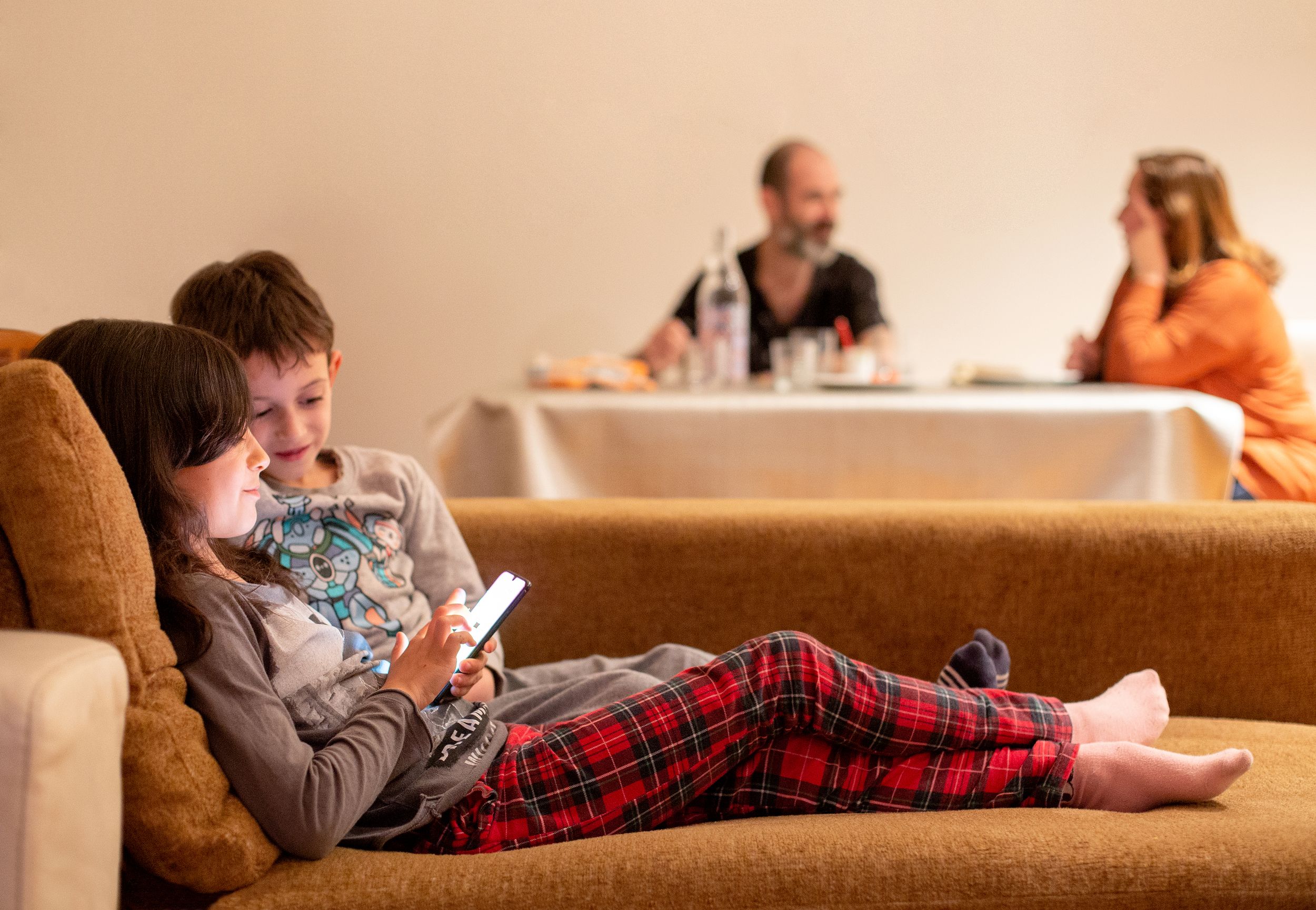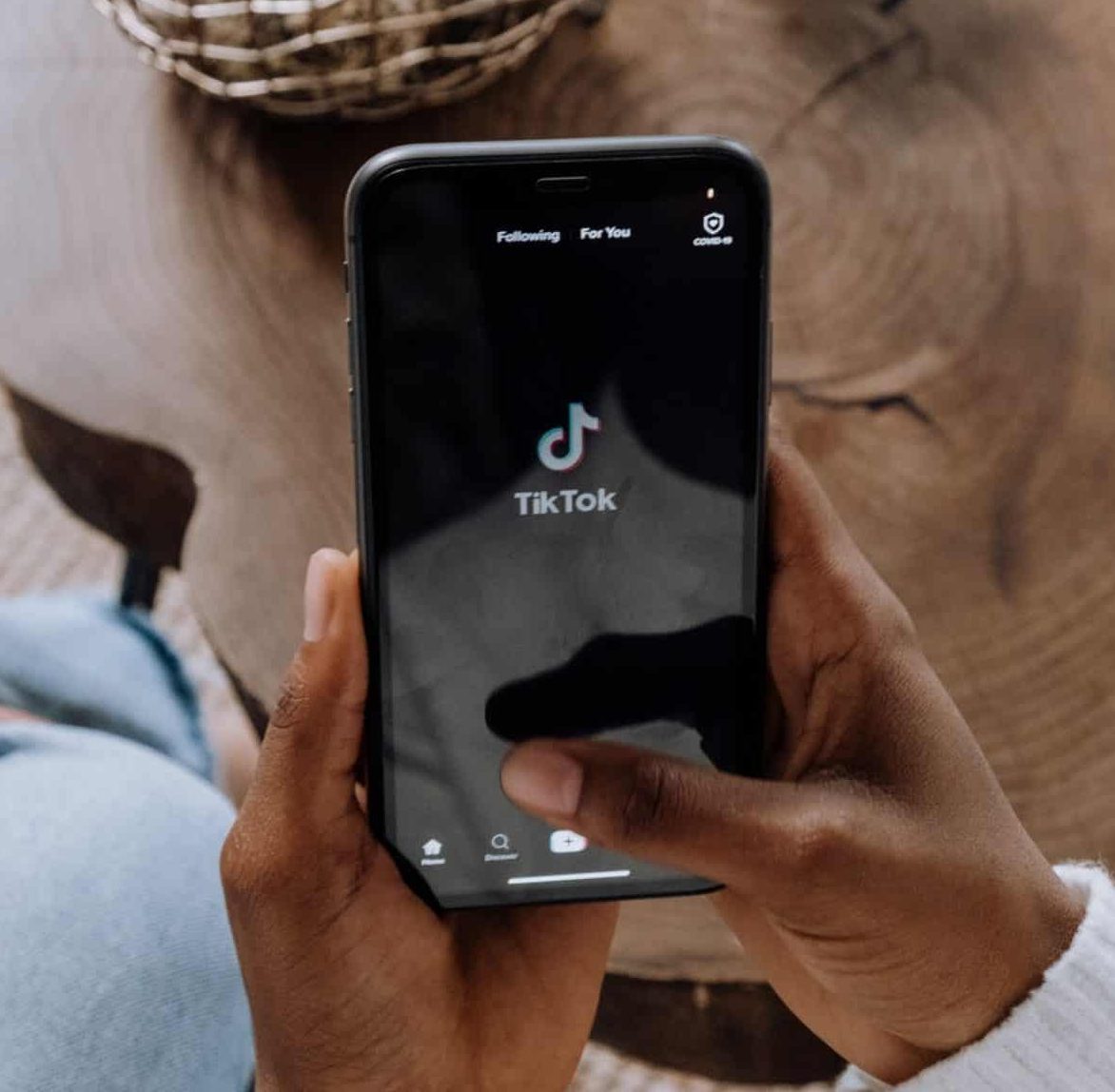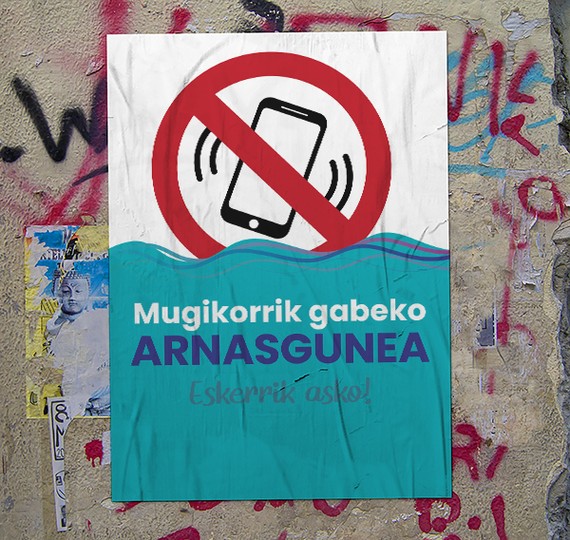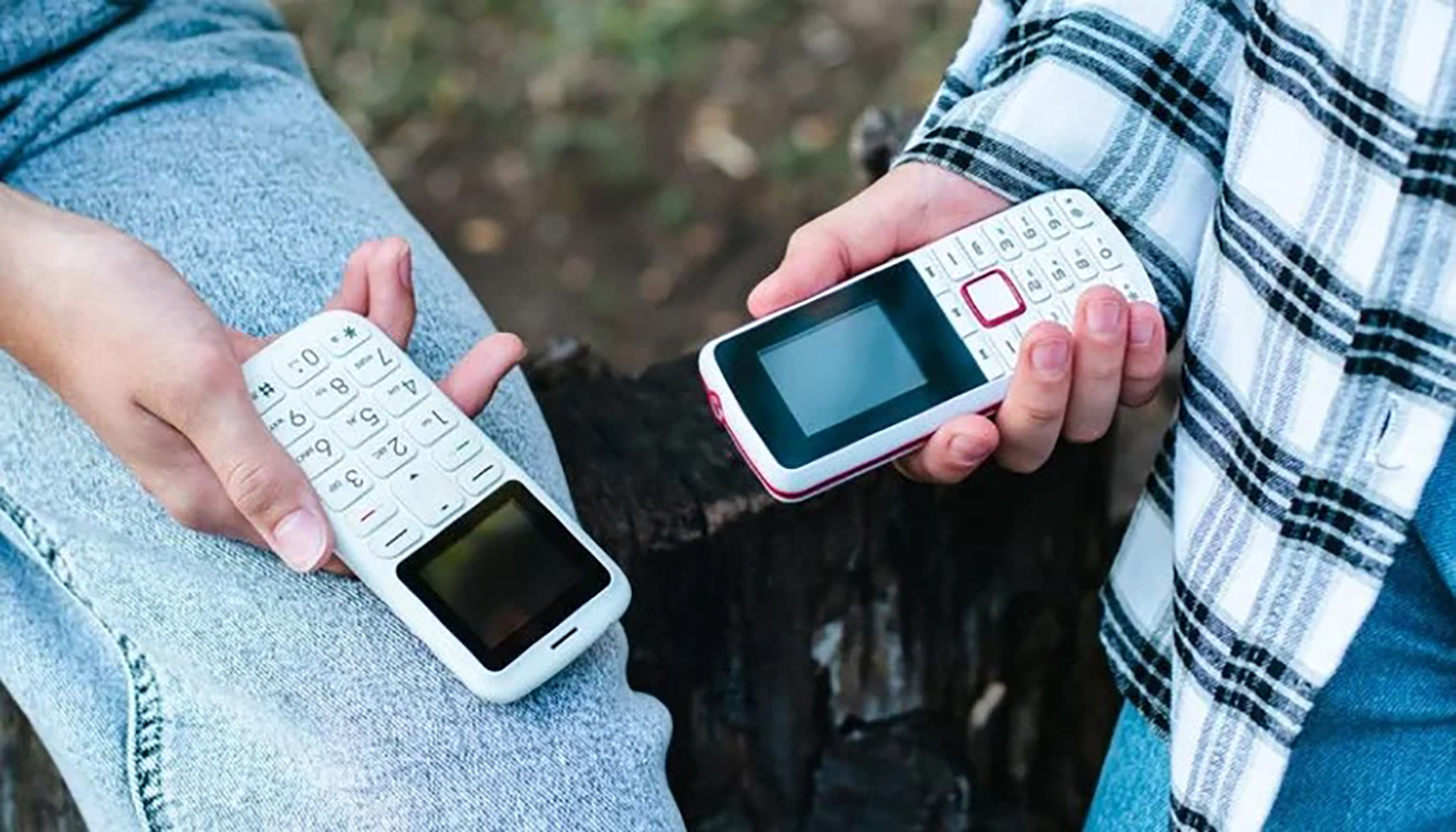First mobile delivery to the child
- For parents, one of the hottest headaches is that of mobiles. Age of acquisition, regulation of use... An inexhaustible source of conflict in many homes, adults begin to meet in several localities in order to work around technology and delay the age of moving children. You're clear that you have to make group decisions, because if you do it separately, all the pieces fall in line, like a domino, because nobody wants the child to feel isolated because they have no cell phone. “We have to be aware that when we buy the child’s cell phone it influences the whole environment,” we are told by members of the “Secure aukera, we 16” group.

Five parents of ikastola Salbatore Mitxelena from Zarautz have created the initiative "Continuity aukera, guk 16", which today seems a "utopia", but which aims to keep children mobile until 16 years old. They know that the results aren't going to come right away, and little by little they're making pacts between parents on the same level to gradually delay enough to give a phone. Along the way, they want to work on the eleven branches of technology, with attention to the use that children and adults do, because we all need to be aware of the "powerful" tool that we have in our hands.
In 2019, they began working on the topic from the school of parents of technology taught by Miren Rose, mother of the ikastola and promotora of the Bidelagun project. “Many of us had the same concern, but each faced it as he could. We realized that if we worked together we could do something,” explains Miren Rose and Amaia Elorza. The latter has two daughters aged 7 and 9 in Salbatore Mitxelena. “We started talking about it, we read the papers from the experts, and we realized that children are getting their phones too early. The brain of a 9-10 year-old child is not prepared to use a size tool because it has no capacity to process all the information, including the one that comes without a filter. There is talk about the development of the child, which an 11-year-old can be very adult for his or her age. No, at least to operate such a device. Adults don’t use it well either!” Here's an example. “We photographed the neighbor’s son and sent him for whatsapp, probably without asking for permission. If parents are often unaware of what we do, think about children. The photos they take from the locker rooms, for example, can do a lot of damage, but at 12 years old they are not aware.”

They asked him how to delay the time to buy the phone? After the questions, they went to the base: If we don't want to give it a phone, why do we give it? The answer was often equal: “We don’t want to be the last of the class.” It's a heavy reason, because after all, the child will feel rejected if they don't all have it. What should be done to ensure that it is not "delayed"? “We saw that we had to come to an agreement to gradually delay the age of moving our children in as many homes as possible.” Many parents of 6th grade Primary Education (EP) (11 to 12 years) decided yes, that at least that course would not buy the mobile. At six months they would meet again to discuss the situation of each and define the steps to follow.
In the words of the members of the association, communication between fathers and mothers, as well as between them and their children, it is fundamental to speak and reach agreements at home: bring mobiles out of the kitchen during meals, turn off wifi at night... “The force of the group is key if the children see that in the rest of the houses they also act the same, they stay quieter”. That requires more time with them and adults to change their habits as well. “It must be made clear to them that it is not a gift, but that instrument is ours, which can be used at specific times for this or for the reason. We are aware that they have been born and educated in a digital world, that cannot be denied, but they have to learn to behave responsibly. And so do we. The rules must be for everyone, so that cell phones are not the main cause of the dispute, as often happens.”
They have explained to us that there is a very different opinion from their own, that they consider it normal for the 9-year-old to have a mobile phone and do not see danger. “It’s legitimate and we recognize it. We are not going to tell them this and you have to. But it is important that parents become aware, think about the issue, talk to others...”
Parents are not saying that children cannot use their phones until they are 18 years old, but that by the time they have their phones it is convenient to discuss the issue.
“Sometimes it’s hard to reach people,” adds Rose. “Many take personally: ‘It’s my decision, let me do what I want, who are you to tell me something?’ Okay, your decision is to buy a cell phone, but keep in mind that it directly influences your child's environment, in the classroom, or among friends. Be aware, because otherwise, we all fall like the pieces of ttak ttak ttak domino.”
How to cope with the wave
Nuria Plaza has a son at Ikastola Langile de Hernani, one at LH3 and one at Compulsory Secondary Education (ESO) 1 (approximately 12-13 years). There, too, about two years ago, some parents with children aged 10-11 began to talk about the subject, after the intervention of Miren Ros himself on the use of mobiles. “Soon the pandemic arrived, relations cooled and it became even more difficult to meet and speak peacefully,” says Plaza. Last year, however, those parents who already had children in LH6 decided to organize a series of workshops and conferences to get things going again. Some made the decision. Send DBH1 without mobile and see if in a few months you could keep the pact longer.
“Pandemic separated us,” Zarautz’s parents tell us, and in that loneliness many bought mobile phones from children, including some who had made “a pact.” “We asked them why and the answers were: ‘Grandma bought him’, ‘I have changed an old cell phone...’ They were not compelling reasons. We realized that if we didn’t do the work, the deal is going to fall.”
Household income and mobile use
At least in part, we will all agree when we are told that we need to be our children's comrades in teaching/learning to critically use technology. But sometimes it is not easy for things to be explained calmly or for the child to move away from screens, although nobody can tell us that they are cheap excuses. About ten years ago, when we talked about the digital divide, the problem was that only the wealthiest children had access to the Internet, but today, when the use of technology has become widespread, the problem is that in families with higher purchasing power it is easier for children not to spend all day glued to their phones, according to the Common Sense Media study in the US. The data shows that the lower the incomes, the longer the smaller the screen will spend. “How many families of workers have the possibility to remove their children from screens? ", says the representative of that organization María Álvarez. Or how do you manage the situation if the parents don't agree to give the child the phone or not? If you're more apart. Because every house is a world.
Participants claim that we are not fully aware of the capability of the devices we leave in the hands of children. We have also been told that there is a lack of interest or perhaps fear of the issue. “I would say that all this technology has taken us on, because the wave is too big,” Elorza believes. Add after: “It’s a big wave, yes, but from our smallness it’s doing things, if we believe in it. If we could buy at 12 and not at 9 to 10 years, it would be a big step, especially if we had previously worked at home. We're not always going to be talking about risks, beware of this and beware of the other, like the Church did, sin up and down, fear. The key is responsible use and highlighting the good.” Because the goal is not to annoy children, as they will surely think.
Rose has also focused on use, and when we ask him about possible "bans" he tells us that it's not an intention, "not at all." It is not being said that children cannot use their phones until they are 18 years old, but by the time they have their phones they should reflect and discuss the issue.
Friends
At the ikastola de Zarautz, the children who were at the beginning of the LH6 initiative are now at DBH2. There are already very few young people aged 13 to 14 who have no mobile phone, many have bought them at Christmas. From 12 to 13 years, only 15 have the rest, and less than half a dozen in classrooms 1 or 2 years. We've been told that kids are pushing, but they've quite easily resisted temptation because they see that many people around them don't have a phone either. “The key is that.”

As everywhere, Hernani’s homes have increased their number of mobiles on Christmas. At the school of employees, about 30 1st ESO students did not have a mobile phone before December and about 10 later. The plaza says that parents have not been able to meet, they miss it as a community on all issues. He believes it is essential to speak and make decisions among all: “If we remember to delay the age of giving the phone a little... There is a lot of difference between buying at 11, 12 or 13 years.” She sets her child as an example: “In view of what he has seen in the institute, conflicts, behavior of some students... To some extent it realizes that they are not prepared to use such a tool. When we give him his assent, I think he will be aware of the risks, their economic cost or the weight of responsibility. He tells us that when friends have it he too will have it so as not to be the only one. That is understandable. In any case, we do not intend to leave our child “isolated”.
Elaboration from childhood
“No parent wants their child to be isolated and when they start the institute they make their phone available,” said technology expert Diana Franco in ARGIA No. 2,771. It talks about the experience of a close parent who has purchased a mobile phone with Android OS and has performed all the operations that the device has requested to use it. The friend is “quiet” because the phone decides what the child can see and what not, when to turn it on and when to turn it off. On the contrary, the father does not have to make too many decisions and the risk of the child being logged in is reduced. La Paz Santa. In the words of Diana Franco, these things should be remembered with her children. He says that our criteria must prevail, because "even if it is not the best, it is a learning path. I believe that under the pretext of reducing debates, giving authority to the technology of our lives harms us more than anything.”
Some parents made the decision to send children without cell phones to ESO 1 and see if in a few months the pact could be kept longer.
Convinced of the need to work before the time comes to donate the phone, from LH3, when children are between 8 and 9 years old, some parents of the ikastola Langile de Hernani will begin the process to, if possible, form a strong group and start a two-way process with the center. “It’s true that the problem for parents is that we can’t leave everything in the hands of teachers, but we have to have a relationship with the school.” As a parenthesis, to say that in 2018 the French Government prohibited students under the age of 15 from using smartphones and smart watches at school, both in the classroom and in the recess or dining room. Many institutes already implemented similar measures, but directors can act today under the law. Institutes may, but are not obliged to prohibit the use of mobiles in whole or in part. In Hego Euskal Herria, something similar happens, although there is no law about it: each educational center acts in the way it sees fit.
Who needs more parents or children?
The context of each child is different: the people in which they live, the neighborhood, the school, the family, if they have special needs... Their day-to-day life is conditioned by many factors, including the relationship with technology, but it seems that it is a well-established habit for children to buy their phones when they take the leap to ESO 1, if not one or two years before. For example, in places where communion is more frequent, many children buy it. In small towns, on the other hand, there is a tendency that when their children go to school in a larger locality, at 11-12 years old, buy the mobile “what happens”. Rose makes it clear: “When ESO starts, they don’t need a cell phone, but a bus. They change center, they have new teachers... And in the middle, we put your phone in. It’s not easy to manage all this.”

We are constantly talking about mobile. However, it should be borne in mind that their absence does not mean that the child does not have technology, or that they cannot make plans with their friends, as this is a recurring argument, because they have laptops, tablets or TVs with Internet access at home or at school. And even if it seems that we forget, there is something else: the whole holy day is spent together.
Rose explains that more than children, parents often feel the need to provide their mobile phone in the name of tranquility. “He will leave the English academy and...” or “the training will end late...” The reasons can be multiple. Elorza is a professor at the Ikastola de Zurriola of young people from 14 to 16 years old and talking about “control” she told us about what was observed there: “I ask the students if they think it is normal for their parents to constantly want to know where they are and I am surprised that most answer yes. They recognize that control is something related to education or paternity and that oysters... Then, in their relationships, they also consider that control, sharing data, constantly asking where the other is, not answering, getting angry...”. Autonomy of the children, teaching to manage themselves, mutual trust, dance of the trio home-leisure school... It is not easy to process. They've been born in a digital environment and adults haven't. To encourage the critical use of technology, we all need to adapt, be aware of the strength of the tool we have, if we want to be as clothed as possible by the time the time comes.
The experiences of parents
We have asked several adults about the issue. They told us:
"My 11-year-old nephew has no cell phone and my mother has told me that she is often rejected because many plans are made by her friends with Whatsapp."
"The DBH1 had an excursion and some children took their phones. Some parents asked the school to have the current standard in the school's operation, not to take a mobile phone to the classroom, also to extend to excursions. They did not receive a reply and on the next exit they all took the phone.”
"Leave 12-13 years for two days. The teachers asked the kids not to carry their phones. Useless. Some of them took him. The teachers decided to remove their mobiles during the excursion; upon returning, a father generated a great chalapite to see who believed they were the teachers to remove their child’s cell phone.”
"The 12-year-old boy was the only classmate with no cell phone. The teacher called his parents, who saw his son rejected, and please bought his cell phone.”
"The 3rd of the ESO can take your phone to the room off. At rest they can use it anyway.”
"Lately we've had the biggest clashes with her 13-year-old daughter on mobile. When we call him, he doesn't attend to us often, he tells us that there was no coverage, that the alarm was silenced ... At home, if not, tablet, always something.”
"By then we parents are asleep and we don't realize, but also at night, that they are video games, Snapchat... I'm not surprised that the faculty says many students get tired in the morning. If at night you turn off the wifi or take off your phone, they get nervous because they lose the news in that interval.”
"At the institute we are told that the young people of the ESO cannot carry a cell phone, that if they take it they will retire and return it to them at the end of the day, and that when they do it for the second time they will be confiscated until the next day. These criteria have told us but they do not meet them, as my son has told me.”
"Your son plays football. Lately, they've stolen a lot of mobiles in changing rooms. They don't realize what it means to leave a cell phone there. Adults don't take it, or we keep it locked, but they ..."
"If it's to call, there are other devices like smart watches. That's the first step, in the 4th or 5th, when they start walking alone in the village. But children don't settle for it."
"My son's roommate is 9 years old, sleep often at night with the tablet under his head, as his grandfather tells us."
"Google's have lived in the pandemic. Google Classroom, for example, is a very appropriate resource for teaching, but I'm worried. How much information about school or children?”
"In high school, 'Las sinmo' is called to girls without a mobile. That makes them different."
"The 12-year-old daughter is the only one without a mobile. The other day he told me that he preferred to stay at home rather than go out with his friends, because they are constantly watching the phone. Sometimes I leave my phone when we're at home. There she jumps, she's introduced me to the contacts of my friends."
"I don't think the 11-year-old needs cell phone. 'What if I want to call you?' he asks us. We answer: 'You know where we're going, where you're going to find your love... It will locate us."
When you work with older people or people with physical and neural diversity, you realize that the idea of competition in our society limits us a lot as a species. That is, our system puts you in value by doing things specifically, and what it doesn't do is incapable of the... [+]
The presence of Elon Musk in the media advances like a rocket after landing in the garden of the White House. Other powers, apparently, have been altered by the power and influence it is acquiring, and to reduce its influence, have charged the X network. In recent weeks, media... [+]
On the Internet comes the title of a movie that I still saw when I was growing up looking for the word Willow. In this fantasy film, the protagonist, a small man named Willow, transformed the world by liberating its inhabitants from an oppressive kingdom. Google just launched a... [+]
Perhaps one of the weaknesses of human beings is the tendency we have to listen to and care for the majority. It has certainly been an important feature of the development of our species and necessary for survival. But with digitalization, that characteristic that we have makes... [+]
In Bilbao, I worked for five years with groups at risk of exclusion around the digital divide, especially with women. Along the way, I came across machistan violence and many other problems. In a very organic way, I began to relate to myself and to understand the work of the... [+]
The evolution that the Internet has taken over the last 15 years, together with its technological and business model, makes us think that it is a tool to increase the worst aspects of humanity. Around the world, agents have been created that are not satisfied with this idea... [+]




















